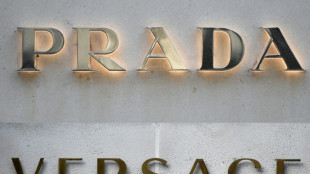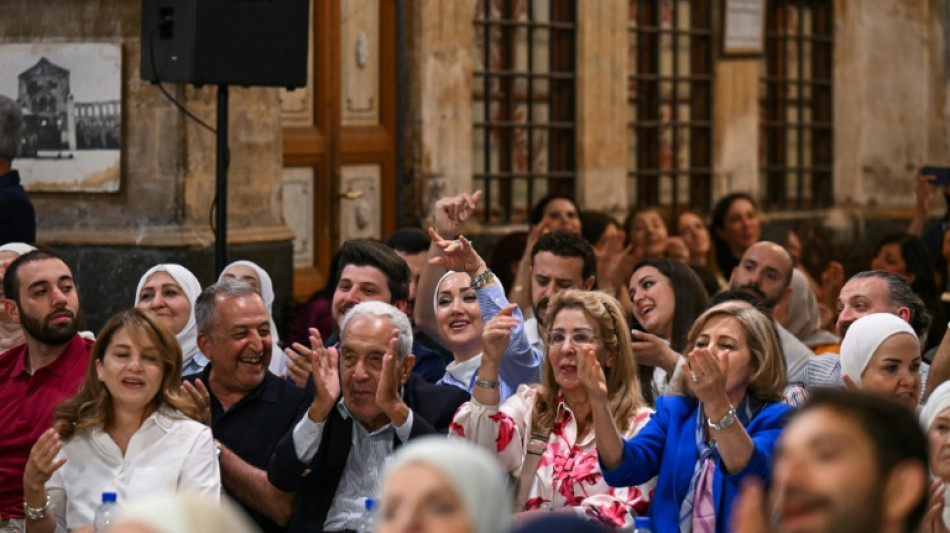
-
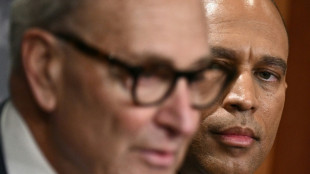 Gold hits record, dollar drops as US shutdown looms
Gold hits record, dollar drops as US shutdown looms
-
Hamas reviewing Trump's Gaza plan
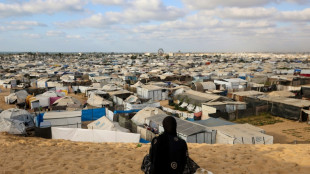
-
 Alcaraz beats Fritz in Tokyo for eighth title of season
Alcaraz beats Fritz in Tokyo for eighth title of season
-
Vietnam jails former officials over gold bar graft: state media

-
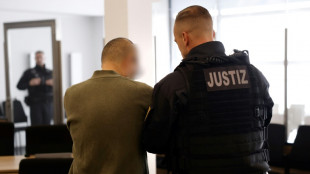 German far-right MP's ex aide jailed for spying for China
German far-right MP's ex aide jailed for spying for China
-
Who will take 30,000 asylum seekers? EU solidarity faces big test
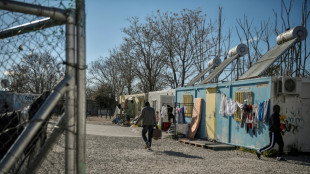
-
 PSG's Kvaratskhelia to miss Barcelona Champions League trip
PSG's Kvaratskhelia to miss Barcelona Champions League trip
-
Endometriosis test backed by French government under scrutiny

-
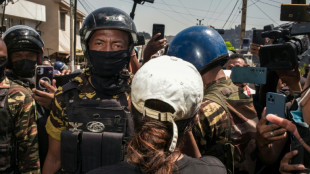 Madagascar protesters undeterred despite sacking of government
Madagascar protesters undeterred despite sacking of government
-
Saliba signs new long-term deal at Arsenal

-
 Sinner powers into Beijing final as Gauff survives Bencic test
Sinner powers into Beijing final as Gauff survives Bencic test
-
Madagascar protesters mobilise despite firing of government
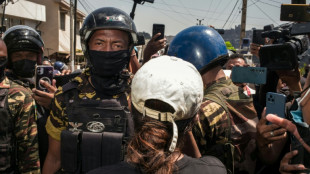
-
 Gauff calls for shorter tennis seasons as 'impossible' to play more
Gauff calls for shorter tennis seasons as 'impossible' to play more
-
Hamas yet to respond on Trump's Gaza plan
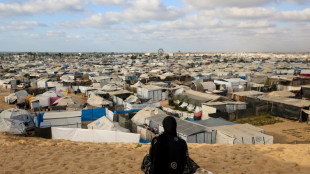
-
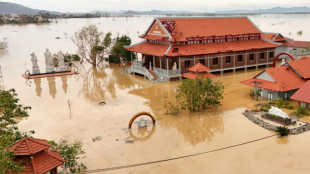 Long-lasting Typhoon Bualoi devastates Vietnam, killing 19
Long-lasting Typhoon Bualoi devastates Vietnam, killing 19
-
Dozens missing, three dead in Indonesia school collapse
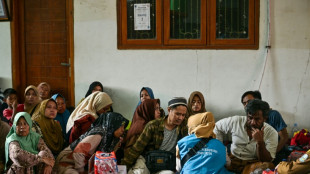
-
 India hot favourites for home Tests against struggling West Indies
India hot favourites for home Tests against struggling West Indies
-
Taliban internet cut sparks Afghanistan telecoms blackout
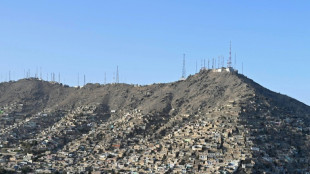
-
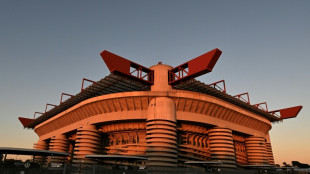 San Siro on course for demolition after sale to Inter and AC Milan approved
San Siro on course for demolition after sale to Inter and AC Milan approved
-
Trial opens over Bangkok murder of French-Cambodian ex-MP
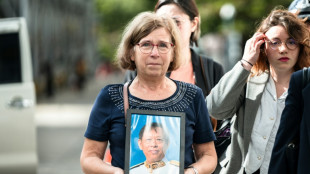
-
 Gauff survives tense Bencic test to reach Beijing quarter-finals
Gauff survives tense Bencic test to reach Beijing quarter-finals
-
US careens toward government shutdown as both parties dig in
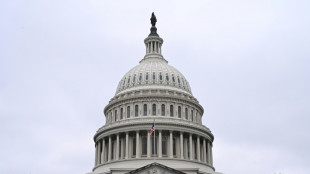
-
 Wolf attack in Greece prompts calls for hunting rights
Wolf attack in Greece prompts calls for hunting rights
-
Trump to address rare mass meeting of US military leaders

-
 Iranian director Jafar Panahi defies censors again with new film
Iranian director Jafar Panahi defies censors again with new film
-
Taliban impose communications blackout across Afghanistan
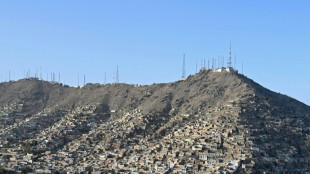
-
 Barca's Yamal eyes up PSG after Ballon d'Or miss
Barca's Yamal eyes up PSG after Ballon d'Or miss
-
PSG facing injury crisis as Barcelona present first big test

-
 British bettor Bloom's football empire blossoming with Belgian club USG
British bettor Bloom's football empire blossoming with Belgian club USG
-
US tariffs on lumber imports set for October 14

-
 Australia lose Maxwell for New Zealand T20s after freak net blow
Australia lose Maxwell for New Zealand T20s after freak net blow
-
India plans mega-dam to counter China water fears

-
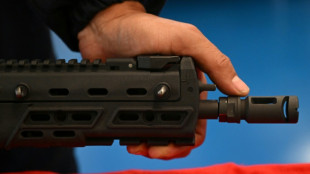 Colombia manufactures its first rifles to replace Israeli weapons
Colombia manufactures its first rifles to replace Israeli weapons
-
Stocks rise, gold hits record as rate cuts and shutdown loom
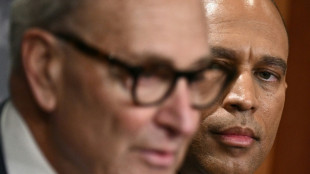
-
 Dolphins star Hill suffers gruesome injury in Jets clash
Dolphins star Hill suffers gruesome injury in Jets clash
-
Paralympics' vote to lift Russian suspension 'bold step' as conflict rages: ex-IOC executive
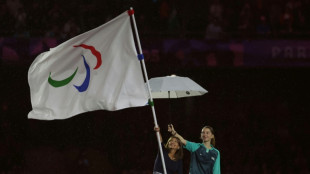
-
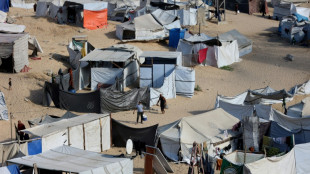 Gazans say Trump's peace plan a 'farce'
Gazans say Trump's peace plan a 'farce'
-
UN Security Council to vote on future of foreign Haiti force
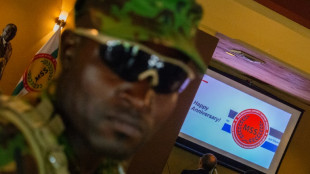
-
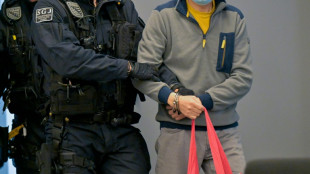 Far-right German MP's ex-aide faces verdict in China spy case
Far-right German MP's ex-aide faces verdict in China spy case
-
YouTube to pay $22 million in settlement with Trump

-
 U.S. Polo Assn. Delivers Elevated Americana With the 2025 Fall-Winter Global Collection From Denver, Colorado
U.S. Polo Assn. Delivers Elevated Americana With the 2025 Fall-Winter Global Collection From Denver, Colorado
-
Internet outrage over Trump's AI conspiracy video

-
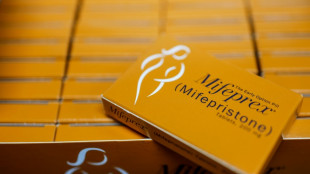 Coalition of states vows to protect access to abortion pill under Trump review
Coalition of states vows to protect access to abortion pill under Trump review
-
Trump meets Democrats without breakthrough on imminent shutdown

-
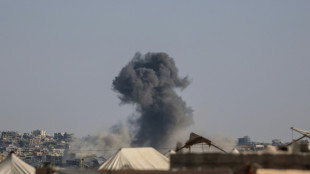 Muslim states join EU powers in backing Trump Gaza plan
Muslim states join EU powers in backing Trump Gaza plan
-
California enacts AI safety law targeting tech giants

-
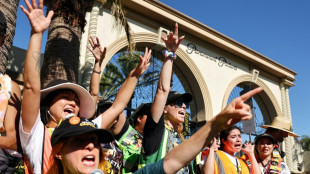 Creator says AI actress is 'piece of art' after backlash
Creator says AI actress is 'piece of art' after backlash
-
Nuno makes his point as West Ham rescue Everton draw

-
 Slot challenges Liverpool players to 'give their all' against Galatasaray
Slot challenges Liverpool players to 'give their all' against Galatasaray
-
Dodgers eye rare repeat as MLB playoffs get under way


Between freedom and restrictions, Syrians navigate new reality
Syrian singer Ishtar halted concerts when Islamist-led forces seized power nearly six months ago. She's now back on stage, but lingering fears have reshaped Damascus's nightlife scene.
Performing an international repertoire to a packed venue in the capital's Old City, she told AFP that "some bars and restaurants were closed and others had problems with licences... but thank God, today we have started to work again."
Since longtime ruler Bashar al-Assad was overthrown on December 8, Syria's new Islamist authorities have not officially imposed restrictions on public behaviour, but some incidents -- mostly described as acts by "individual" perpetrators -- have sparked worry about personal freedoms.
Ishtar, 26, said that after Assad's ouster "we stopped all our activities -- we became afraid of singing openly anywhere".
Since then, however, locals and foreigners have crowded into cafes, restaurants and bars in the capital, discussing political and individual freedoms as well as issues once considered taboo like the fate of missing people and the deposed government's notorious prisons.
But recent weeks saw two attacks on nightclubs, one of them deadly. Authorities said they had arrested those involved in one of them.
The international community has urged the new authorities to respect personal freedoms, protect minorities and involve all components of Syrian society, including women, in the country's delicate transition.
Facing criticism, the authorities have sought to present a flexible and open model of governance.
- Uncertainty -
"We don't want division or for society to be split between those who want (diversity) and those who oppose it," said Ishtar, who studied opera and blends musical styles during her performances.
Pensioner Rima Shashati, who was among those in the audience, expressed optimism.
The negative incidents that took place have "generally been individual acts", she said, but after long years of war, "we need to join together and love each other".
At times, young men have chanted religious slogans outside bars serving alcohol in Damascus's Old City or called for their closure, according to video footage.
Security forces have raided and closed some bars for not possessing a valid alcohol licence despite them having been open for years, sparking concern among employees and patrons.
One bar owner said the Assad government "would close unlicenced bars then let them reopen after they paid fines or bribes".
"Now, it seems they will be closed permanently," he told AFP, requesting anonymity due to security concerns.
Alongside other licenced venues around him, he said he welcomed customers until late. Security patrols routinely pass by the area without any problems.
In a sign of the tensions, some social media users have lashed out at girls wearing swimsuits or dancing.
Videos showing female university students wearing a face-covering niqab and rumours claiming the prohibition of gender-mixing in buses have caused heavy controversy.
- 'Still on the path' -
AFP reporters did not observe gender segregation on buses at a major station in Damascus.
However, a traveller from Damascus to the north of the country said that a driver had asked her to sit far from her male friend in case the bus was stopped at a security checkpoint.
Vehicles blasting Islamic messages have been seen driving slowly around the streets of Damascus.
At an exhibition of anti-Assad posters from the early days of the country's civil war, at a Damascus train station, 29-year-old Abdel Rahman Lahham told AFP he had been stopped by a man in military uniform for wearing shorts.
"He told me, 'Do you know that your outfit is haram?'," or forbidden on religious grounds, Lahham said.
When swimming pools reopened this month for the summer season, some kept their regular dress codes and allowed mixed attendance, while others have been hesitant.
A hotel whose pool used to be open to the public is now only for guests.
One large hotel has restricted the service of alcohol to private rooms after previously offering it at the restaurant, guests told AFP.
Majed al-Naasan, 33, who returned to Damascus in February after a decade in Austria, said "there is concern, but it's not just linked to the government", but to the fact that "we are still on the path to stabilising security".
"There is worry in Damascus, but there is also the will to live," said Naasan, who organises cultural events.
E.Burkhard--VB

